Richard Dawson’s new state-of-the-nation album refuses to sugar-coat a broken society
While allowing us our number one coping mechanism in such bleak times
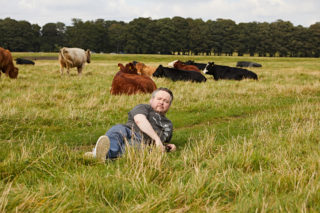
While allowing us our number one coping mechanism in such bleak times
Richard Dawson believes in the power of song. “The song is magical,” he says. “I mean real magic. It can affect things, at its best. That’s what a song is capable of.” The words come softly from his mouth, gently spoken, humble and understated. Dawson is all of these things, although if it were up to him, you would never know that he himself is one of the most empathetic and incisive songwriters of his generation.
“I don’t mean to suggest that any of these songs necessarily do that,” he continues, referring to the ten tracks that make up his astonishing new album, 2020. “Although it’s got to be the aim. I feel like maybe the aim with a lot of songs you hear is not to change things, but to sell things.”
He has a point. We talk across a table at one of his favourite cafes in his native Newcastle-Upon-Tyne a few weeks ahead of the release of 2020, his sixth studio album. After the relative breakthrough of 2017’s Peasant, an album set in Bryneich, the kingdom that occupied the North East of England over 1000 years ago, this record is, on the face of it, a marked departure.
Its songs are rooted, as the title suggests, in the here and now. Each told from the perspective of a different character, they make up a patchwork of contemporary England, and not a positive one. Homelessness, zero hours contracts, the indignity of work, the cost of living, fear of climate change, all made fearsomely real.
“If you’re really not well off, even if you’re doing reasonably comfortably, you’re still struggling. Even if you’re quite well off, you’re still struggling. It’s across nearly all spectrums,” Dawson explains. “One aspect of the album that I wanted to be there was this idea that people can exist so close to each other but have such different situations. That feels like something that’s quite part of the fabric of society.”
Pay a little more attention, however, and it’s clear that these subjects have always been at the heart of Dawson’s writing, whatever century the setting. “I joked on tour with Peasant that it was a pre-medieval album as a metaphor for our current times, and the next one will be set currently but will be a metaphor for the pre-medieval times. I like the contradiction – maybe you have to step outside your own section of time to get more connected.”
It most certainly feels connected, both to this time and to the real lives of the people all around us. That has always been Dawson’s skill, dating back to his earliest recordings. After establishing a cult local following with albums such as 2011’s The Magic Bridge, his exposure rose to the next level with the release of Nothing Important in 2014, his first for Weird World Records. His free range, hyper-personal storytelling, as evidenced by the 16-minute opus ‘The Vile Stuff’, which documented a real school trip from Dawson’s adolescence that descended into alcohol-fuelled debauchery, seized the attention of several corners of the music press and made Dawson one of the buzziest names in British alt. music. His live shows, a blend of primal, eviscerating expression and down-to-earth conversations with the audience, only cemented his reputation.
When he set about writing the songs for this album, he started speaking to people: friends, family, but also people that he would meet after gigs or in his everyday life. “Certain things kept coming up,” he says. “You want to be careful with people’s experiences and certainly not trivialise them. You know, like, there are some writers that are like vultures, they just vampire your experiences for their own gains – I hope it’s not like that. It’s a fine balance between being faithful to your own experiences and that of your friends, but at the same time you have to follow where these characters want to go.”
It is this dedication to his characters that sets 2020 apart. Whether assembled from genuine real-life stories or spun out from Dawson’s fertile mind, he has created his own dramatis personae, each role fleshed out in touchingly honest detail. From the jogger who fruitlessly searches for properties he can’t afford on Zoopla to the civil servant who fantasises about smashing his colleague’s skull in with a sellotape dispenser, each one is deeply relatable. Dawson voices them all himself, from the perspective of the characters’ inner voices, at their most private and intimate.
“I like the idea of maybe having something that functions more like thought, more like that blooming, misty process,” he explains, when asked how he begins to access the innermost thoughts of these characters. “It’s not crisp, it’s poetic in its own way, the way we think, but it’s not usually wordy or that erudite. At least my thought isn’t. And it’s not fast.”
The result is a convincing depiction of our normal stream of consciousness – the lyrics sound like our thoughts. “It’s funny that people aren’t afraid of that stuff in novels or films. I think there’s something strange that’s happened to song that people underestimate what it can do.
“I don’t know why that is, whether it’s because it’s become a functional thing for getting people to work, or for allowing for there to be adverts in between them so it has to be short and direct and simple. Is it people’s attention spans? I don’t believe that.”
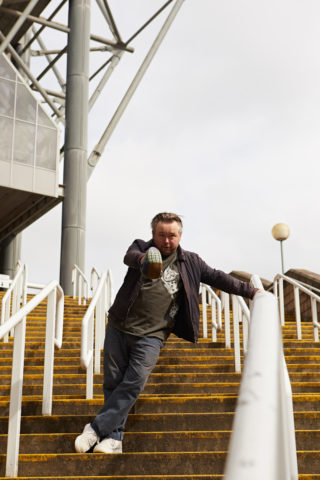
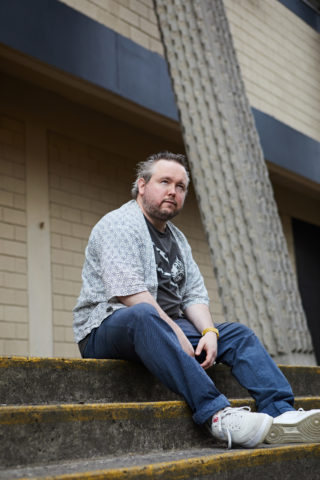
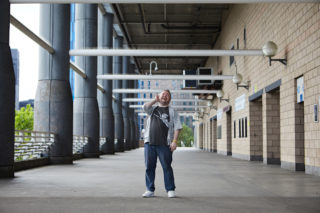
The more time Dawson spent focusing on writing these songs, the more naturally he was able to write in the voices of these characters. “With the lyrics more and more, it’s not that I’m writing it, it’s that I’m asking, ‘What does this person want to say?’ I think a lot of writers have this experience, you just find the character and then they write the song. That really felt like what was happening more acutely with this one than with previous albums.”
It speaks to his naturalistic songwriting style that simply holding a conversation with Dawson is like stepping inside one of his songs; the greasy spoon setting for our meeting could be a typical backdrop too. At one stage, in a lull between the clattering of piled plates coming from the kitchen, and with the chatter of the neighbouring tables falling quiet, Dawson lowers his voice, eager not to draw attention to himself as he talks about his work. He is somewhat reticent to discuss the music in any great depth, preferring to let it speak for itself. “Potentially, I could undo something I’ve worked hard on,” he explains. Partly, you suspect, he is surprised that anybody should care to ask.
The acute embarrassment is heightened by the prospect of out photoshoot – for somebody so rooted in the regular order of a working class city, such demonstrable acts of self-recognition seem like a violation of an unspoken social contract. He suggests we leave the café to shoot in an empty field instead – empty, that is, save for a small herd of cows, an audience that prove to care very little about Dawson’s modest level of fame.
One subject that recurs throughout the new record is the issue of mental health. The aforementioned protagonist of the album’s lead single ‘Jogging’ introduces himself with the lines, “Recently I’ve been struggling with anxiety/ To the point I find it hard to leave the flat.” Several of Dawson’s other characters display similar signs of ill health.
“Certainly in terms of mental health struggles, we all have them to a lesser or greater degree, a lot more people to a greater degree than at any other time,” says Dawson. He agrees that we are just starting to have a better public discourse on the matter, before adding, “Whether that’s because we’re learning to look after ourselves a bit more, or whether it’s a reaction to things getting more confusing, I’m not sure.”
If this is all sounding a bit bleak, then it should be noted that 2020 is, as with all of Dawson’s work, laced with humour and warmth too. Take, for example, the track ‘Two Halves’, the most recent single. Our leading man this time is a young man playing amateur football in the park, his dad screaming instructions from the touchline, all in vain. It is a sweet, quotidian tale, where the pathos comes from the familiarity of the situation.
“That’s quite a happy song,” Dawson agrees. “It’s not happy for the kid going through it in that moment, but I think it’s a joyful thing. I guess you think that the dad is a total bell-end, but he has some pretty good advice in the end.”
One of the consequences of depicting the innermost thoughts of members of the public is that you will inevitably stumble across the strains of humour that litter all of our conversations, our number one coping strategy. Intriguingly, Dawson has found, though, that the lines that at first might seem funny actually conceal some of the harshest darkness.
Take the song ‘Heart Emoji’, which sees the lead character recount the early days of his current relationship. His mind travels back to the day they met, whilst both working in the bar of the Carling Academy, and she was “giving him a bollocking for pouring a Guinness wrong”.
“What I’ve found is that the most ridiculous things on the record are always the saddest lines,” says Dawson. “Nothing’s in there to be funny, but I know it’s funny to hear certain words sung. I think because that person – this is before they’ve even started a relationship, right at the start – that one person is already being dominant over the other, over such an unimportant thing.”
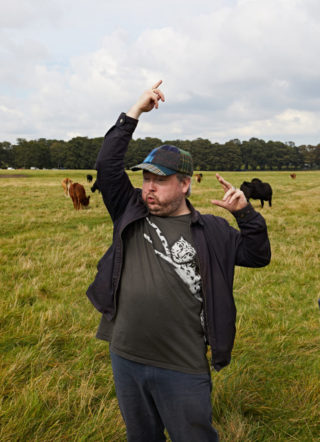
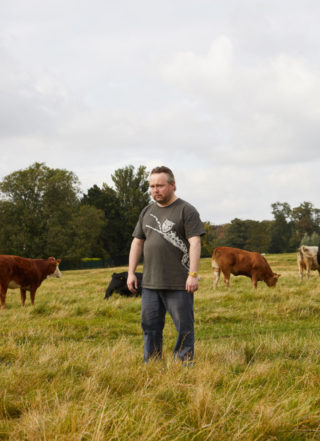
It’s very clear when talking to Dawson that his passion for language is boundless. “The written word and the sung word, it wasn’t always available to everyone like it is now, it was the province of the educated, which would be religious people and the upper classes. So it’s definitely a good thing that the word is available to all now, although I wonder whether it’s been misused, maybe for advertising.”
It’s not just words that he takes seriously, either. For this album, he undertook to play every part on every instrument himself. He explains, “That felt important for this one. I can’t play drums, so I had to do it one drum at a time. It’s ridiculous, it took a while, I think we were recording for a month or so.
“I like the tense feeling that it gives, it sounds a little bit stilted. It’s the first time I’ve used the rock drum sound and I wanted this to appear as a straighter album, but actually it still needs this awkwardness. So how do I get that? Well, maybe I get someone who can’t play drums to play the drums!”
Only for the final moments of the closing song does Dawson allow any other musician to be heard on 2020, the rousing finale of ‘Dead Dog in an Alleyway’. “I think the content of the album and especially the last song is quite difficult, with some abject moments,” he says. “But at the end of the last song, I’m joined by Rhodri [Davies] and Sally [Pilkington, both from Hen Ogledd] and Nev [Clay], and they appear just as I’m starting to fade out. I thought after being alone all the way, for my friends to come just at the end, it’s a very happy thing. Even if it’s not apparent, it’s still there and the energy of that means something.”
Reckoning directly with the state of the nation, as Dawson does here, means eventually having to address the politics of the day. The album never resorts to naming and blaming, but the all-pervasive effects of nearly ten years of austerity politics, twinned with the confusion following the re-alignment of the country from traditional left and right to a poorly defined axis of leave and remain are writ large in every song.
“I watch the news every day, it’s my first thing. I’m fascinated by parliament,” Dawson explains, the cold irony being that he speaks on the very day that Johnson’s Conservative government choose to prorogue for five weeks. “I’m really frightened at the minute about stuff, even to the point of thinking like, if things go a certain way, I think that I might just think about leaving the country. At what point do you make that decision, if there is some kind of horrendous coalition. I just feel quite frightened.”
Dawson admits that his fear and anger partly fuelled the album: “I suppose so, yeah. Why isn’t anybody making an effort to try and wake people up a bit? I feel like we’re all switched on to Brexit and we’ve fallen asleep to all the other things. I wanted the start of the album to be an alarm clock, or a bell.”
I remind Dawson of the first time I saw him play live, at the Islington Mill in Salford, almost four years ago to the day. It was in the immediate aftermath of Jeremy Corbyn’s election as Labour leader and Dawson himself was full of hope that day.
“Regardless of what’s happened since, something major did happen, something did change,” he says. “Whether it’s the thing that we thought, it was a positive thing, that’s not altered.”
2020 arrives at a time when more and more British musicians are taking it upon themselves to speak out; slowthai, Kate Tempest and Idles amongst the most visible of them. One of the voices that Dawson particularly enjoys is that of Sleaford Mods’ Jason Williamson. “To me, he’s a great writer. It’s good writing because it’s personal. It’s not political, it’s heartfelt.”
What he has less time for is the more brazen end of political songwriting. “There’s a danger with protest music, it’s usually bad. It needs to be something else first if it’s going to have any effect. If you’re being polemic and you’re telling people what to think, it’s a reaction, it’s not a response. It has to be open and generous.”
He admits that this was a concern when making this album. “It’s just one thing you’ve got to watch out for. It was really tricky for this one, because I always want to watch out for clichés,” he says, returning to the subject of finding the true voices of his characters. “But then I realised that we think in clichés quite a lot. We tend to have quite black and white thoughts, at least in the first instance. So my thing is if I’m going to be faithful to these people, then I have to be faithful to some moments of thought which aren’t me and some things that I have trouble singing.
“I always want to over-write everything,” he continues. “So, Peasant was really enjoyable to write because it was really chewable, lots of words. Whereas this was really hard because all of those lines, I’m just [tempted] to put clothes on them. But we need to get to the point, instead of dressing it with all this wordiness, people don’t think like that. It’s barely words that we think in as well, it’s images, words, sounds, smell. I don’t know how you would write that.”
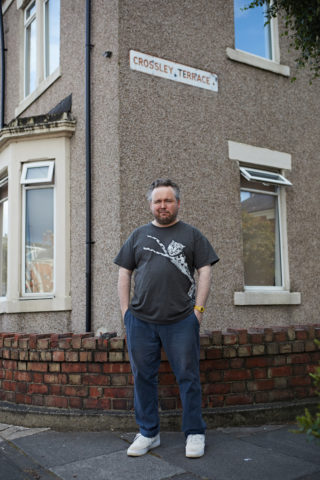
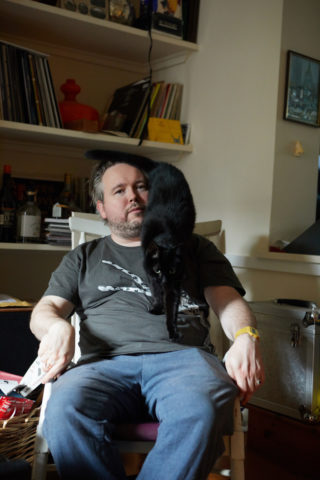
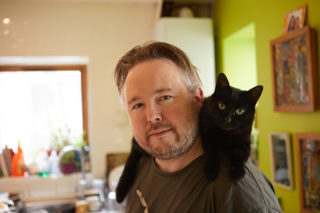
One way in which Dawson is able to ground his characters’ thoughts in real life is by dropping everyday pop culture references into the lyrics: Ready Brek, Nintendo Wii, Lionel Messi, Classic FM and Match of the Day, to name just a few. It’s certainly a far cry from the vassals and villeins that constituted Peasant.
Dawson is amused by the idea that there should be anything unusual about his use of such commonplace references. “It’s pretty strange because it’s the most everyday stuff, but you don’t get it in lyrics, so it seems like, ‘Woahhh’. I don’t know why.”
When asked whether there are any writers he can point to that do similar things, he refers to the cult Newcastle songwriter Nev Clay. “He’s not really known outside of the North East,” he says, “but he’s a master songwriter, a beautiful man and a good friend. But he’s lyrically unafraid. For instance, I’m thinking of one of his songs, and it’s carrier bags and stamps and asking to borrow tabs off people and off licenses. Because that’s what he sees so he writes it.”
Few if any interviews with Dawson ever pass without dwelling for a period on his Newcastle background. He has lived all of his 38 years in the city (“I toyed with moving maybe twice, but I haven’t lived anywhere else yet”), but he feels that may have been overplayed.
“I kind of understand why [it is brought up], because I mention a lot of place names and stuff. And I just went along with that, but I started to think about it and started to realise that it’s not quintessential to the music. You don’t have to be from the North East to enjoy the record, hopefully. I’m sure it’s in there, but it’s not something I’d really go along with.
“So it was a conscious thing with this record that the locations, there are a lot in Yorkshire and right up to the Scottish border. But some parts are Southern as well – there are place names from London, Nottingham and Coventry. A broader, non-descript swathe.”
The notion of local pride or anything that could approach patriotism has become something of a divisive issue, given the current climate. Dawson is clear that he does love his part of the country – we later go on a pilgrimage to St. James’ Park – but is clear to remain unambiguous. “I think that it’s a very knife-edge thing, how to be correctly proud. You go some places and they’ve just got it right. Some of the atmospheres are increased in certain places. But certainly there’s nothing wrong with being proud of where you’re from.”
Indeed, the Newcastle music scene has been very good to Dawson. He is a member of the group Hen Ogledd, alongside Sally Pilkington, his partner, and Rhodri Davies and Dawn Bothwell, who have recently wrapped up a tour. Dawson loves balancing the group’s work with his solo career: “It’s such a different energy,” he says. “I find my solo stuff is quite draining, whereas Hen Ogledd, I find that quite energising. I find I’ve got more energy from doing both, it feels good at the minute.”
It was in fact Pilkington that introduced one of the key elements of the making of 2020 into Dawson’s life: a newfound love of pop music.
“I’ve always liked bits and pieces but I’ve never known too much about it,” Dawson tells me, “but she’s got an encyclopaedic knowledge of ’80s and ’90s stuff and I started to really like a bunch of sounds, like the crisp, unadorned synth sounds, not on the kind of cool side, not like John Maus, but more like the synths in Sign o’ the Times. It really opened up my ear to Erasure and all that stuff, and just the beautiful craft of how you can move so much in four minutes.”
Dawson is a self-confessed music obsessive, but for the last year, between recording this album and juggling the Hen Ogledd project, his listening habits have been focused between three artists: Scottish experimental producer SOPHIE, free jazz demigod Sun Ra and his personal favourite, the Finnish prog rockers Circle, who he concedes he can hear bits of creeping into his own music now.
But it’s the evidence of the pop influence that is more prominent, if not quite front and centre, on 2020. Tracks like ‘Two Halves’ and ‘Dead Dog in an Alleyway’ make use of bold melodies to convey their emotional power. When Peasant was released two years ago, it was judged by some to be Dawson’s pop album, but this one surely takes that mantle now.
“Yeah, why not!” is his response to that suggestion. “I really wanted the choruses to be big, anthemic, but then the words would not be that, they would be in opposition to that. You know, there’s this pull on Peasant with the music [going one way] but then this other layer with the violin and the free stuff really pulling it apart [in the other direction]. I had to think how to achieve that on this album. It needed to be much more spacious and crisp, so how do we achieve this tension? I hope the lyrics being in opposition to these melodies can make it snap somewhere.”
All of which underlines quite how hard it is to understand why Dawson continues to be tagged as a folk musician. It is true that for years his live sets would be peppered with folk songs from the North East, but his songwriting and musicianship does not fit neatly into any such tradition. “I don’t really mind, it’s not something I think about, it’s not important for me.”
What Dawson finds surprising is that he is often described as something of an outsider, or at least in possession of a uniquely distinctive style. He does at least concede that his method of playing the guitar is not in keeping with most conservative conventions: “There’s very much a way of playing a guitar, so if you deviate from that… But that’s not to do with what the guitar is capable of, that’s just to do with expectations.” Certainly, he isn’t overly concerned about meeting any new listener’s expectations. “I’m always surprised that people might find it distinctive. I’m not worried about trying to be distinctive or anything like that. It’s just more about whatever the piece needs.”
Whatever the formula, Dawson’s career has been on a steady upward trajectory for the last decade, with 2020 the third album he has released on Weird World, the Domino imprint, a label about whom Dawson is effusive with praise.
He is still getting used to the idea that there could be a demand for his music, though. “It’s still a surprise,” he admits. “As much as I don’t set out to do something odd, I’m kind of aware why people could hear it that way, maybe the singing is abrasive or something. So it’s always a surprise. But at the end of the day, it’s not the thing, the work is the thing, and that’s out there. What’s the David Lynch thing – keep your eye on the doughnut and not the hole?”